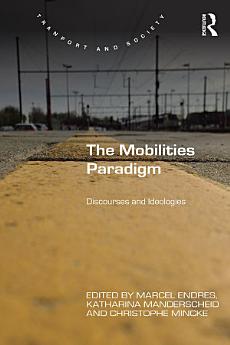The Mobilities Paradigm: Discourses and Ideologies
Marcel Endres · Katharina Manderscheid · Christophe Mincke
মে’ ২০১৬ · Routledge
ইবুক
248
পৃষ্ঠা
family_home
যোগ্য
info
reportমূল্যাংকন আৰু পৰ্যালোচনা সত্যাপন কৰা হোৱা নাই অধিক জানক
এই ইবুকখনৰ বিষয়ে
Over the last two decades, the conceptualisation and empirical analysis of mobilities of people, objects and symbols has become an important strand of social science. Yet, the increasing importance of mobilities in all parts of the social does not only happen as observable practices in the material world but also takes place against the background of changing discourses, scientific theories and conceptualisations and knowledge. Within the formation of these mobilities discourses, the social sciences constitute a relevant actor. Focussing on mobility as an object of knowledge from a Foucauldian perspective rather than a given entity within the historical contingency of movement, this book asks: How do discourses and ideologies structure the normative substance, social meanings, and the lived reality of mobilities? What are the real world effects of/on the will and the ability to be mobile? And, how do these lived realities, in turn, invigorate or interfere with certain discourses and ideologies of mobility?
লিখকৰ বিষয়ে
Marcel Endres is a PhD Candidate at Darmstadt University of Technology, Germany.
Katharina Manderscheid is Lecturer at the University of Lucerne, Switzerland.
Christophe Mincke is Operational Head Criminology at the National Institute for Forensic Sciences and Criminology and Professor at the Saint-Louis University in Brussels, Belgium.
এই ইবুকখনক মূল্যাংকন কৰক
আমাক আপোনাৰ মতামত জনাওক।
পঢ়াৰ নির্দেশাৱলী
স্মাৰ্টফ’ন আৰু টেবলেট
Android আৰু iPad/iPhoneৰ বাবে Google Play Books এপটো ইনষ্টল কৰক। ই স্বয়ংক্রিয়ভাৱে আপোনাৰ একাউণ্টৰ সৈতে ছিংক হয় আৰু আপুনি য'তে নাথাকক ত'তেই কোনো অডিঅ'বুক অনলাইন বা অফলাইনত শুনিবলৈ সুবিধা দিয়ে।
লেপটপ আৰু কম্পিউটাৰ
আপুনি কম্পিউটাৰৰ ৱেব ব্রাউজাৰ ব্যৱহাৰ কৰি Google Playত কিনা অডিঅ'বুকসমূহ শুনিব পাৰে।
ই-ৰীডাৰ আৰু অন্য ডিভাইচ
Kobo eReadersৰ দৰে ই-চিয়াঁহীৰ ডিভাইচসমূহত পঢ়িবলৈ, আপুনি এটা ফাইল ডাউনল’ড কৰি সেইটো আপোনাৰ ডিভাইচলৈ স্থানান্তৰণ কৰিব লাগিব। সমৰ্থিত ই-ৰিডাৰলৈ ফাইলটো কেনেকৈ স্থানান্তৰ কৰিব জানিবলৈ সহায় কেন্দ্ৰত থকা সবিশেষ নিৰ্দেশাৱলী চাওক।





